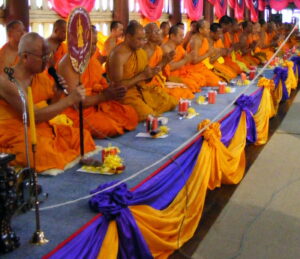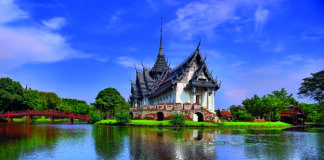Thailand, a captivating tourist destination known for its vibrant culture, breathtaking landscapes, and warm hospitality, attracts millions annually. While Thai people welcome foreigners with open arms, visitors must familiarize themselves with local customs and traditions to ensure a respectful and enjoyable experience. This guide will outline the key behaviors and cultural aspects to avoid when visiting Thailand.
Respecting the Monarchy:
In Thailand, the monarchy holds a position of deep reverence, and Thai citizens greatly respect and admire their royal family. It is highly offensive to display any form of disrespect towards the King, Queen, or other members of the royal family. To avoid offending, refrain from commenting negatively or engaging in discussions that may be interpreted as disrespectful towards the monarchy. Handling images or representations of the royal family with the utmost respect is also essential, as any misuse or desecration is illegal and carries severe consequences.
Observing Buddhist Traditions:
Buddhism significantly influences Thai culture, and most Thais fervently practice this religion. When visiting temples or religious sites, it is crucial to dress modestly and appropriately. Men and women should cover their shoulders and knees and remove their shoes before entering the temple grounds. Inside the temple, maintain a quiet and respectful demeanor, as it is customary to behave with reverence. It is considered disrespectful to touch or sit on Buddha statues, as they are considered sacred objects.
Public Displays of Affection:
While public displays of affection may be standard in many Western countries, it is essential to be mindful of Thai cultural norms. In specific settings, exhibiting overt displays of affection, such as kissing, hugging, or holding hands, can be viewed as inappropriate or offensive. Modesty and reserve are highly valued in Thailand's public spaces and religious sites. To avoid causing discomfort or misunderstanding, travelers should refrain from engaging in excessive public displays of affection.
Avoiding Insults to Buddhism:
Thailand's deep-rooted religious beliefs mean that insulting or criticizing Buddhism is seen as highly disrespectful. Steer clear of derogatory remarks or engaging in discussions that belittle or mock the religion. It is essential to be sensitive to the significance of Buddhism in Thai society and appreciate its positive influence on the lives of Thai people.

Respecting Thai Culture and Customs:
Thailand boasts a rich cultural heritage, and Thai people take immense pride in their traditions and customs. Show respect and awareness towards local businesses to avoid unintentionally offending. One example of customary practice in Thailand is the removal of shoes when entering someone's home or a temple. Pointing with your feet or touching someone's head, considered the most sacred part of the body, are disrespectful actions. Familiarize yourself with basic Thai etiquette and gestures to interact respectfully with locals.
Acknowledging the Wai:
The wai is a traditional Thai greeting where the palms are pressed together prayerfully, accompanied by a slight bow. Thais use the wai as a sign of respect and commonly greet others, show gratitude, or apologize using this gesture. It is essential to reciprocate when offered, especially by elders or individuals in positions of authority. Failing to return a wai can be seen as disrespectful.
Steering Clear of Illegal Activities:
Thailand has stringent laws, and involvement in illegal activities can have severe consequences. Avoid drug trafficking, purchasing or using illicit drugs, or participating in other criminal behaviors. Additionally, respect local laws related to wildlife, such as refraining from purchasing products from endangered species or participating in animal abuse.
Understanding Lèse-majesté Laws:
Thailand enforces lèse-majesté laws that prohibit any form of criticism or negative comments towards the monarchy. This includes disrespectful speech and sharing or endorsing such content on social media. Please exercise caution when discussing sensitive political topics, as they can also be intertwined with the monarchy. It is essential to take preventive measures to avoid legal complications and the possibility of imprisonment; it is best to avoid discussing the monarchy or Thai politics.
Appreciating Thai Cuisine:
Thai cuisine is globally renowned for its distinctive flavors and spices. When dining in Thailand, demonstrate respect for the local food culture. Avoid wasting food or displaying disdain for unfamiliar dishes. Exercise caution when requesting modifications to traditional dishes, as altering the chef's creation may be perceived as disrespectful. Embrace the opportunity to savor new flavors and indulge in Thailand's diverse culinary experiences.
Conclusion:
Thailand's rich cultural heritage and warm hospitality provide a remarkable experience for travelers. Visitors can forge meaningful connections and enjoy a memorable time in the Land of Smiles by understanding and respecting local customs, traditions, and values. By avoiding the behaviors above, travelers can demonstrate their appreciation for Thai culture and contribute to a positive cross-cultural exchange, fostering mutual respect and understanding. Remember, a minor cultural sensitivity goes a long way in creating an unforgettable visit to Thailand.















